Engaged in the clothing industry for 20 years.

BAPE’s Tokyo homecoming looks back on 30 years of leadership in streetwear
In the heart of 1993’s Harajuku, Tokyo’s home of outlandish fashion and
subcultures, A Bathing Ape – more commonly known as BAPE – was born, a
lifestyle brand that promised to offer up a renewed take on streetwear
through the eyes of its already acclaimed founder Tomoaki Nagao, or Nigo.
As a devout hip hop fan, Nigo formulated the brand through his own interest
in the music scene of Japan, ultimately creating the label alongside
collaborator Shinichiro Nakamura, also known as Sk8thing.
BAPE quickly became a household name in the region, renowned for its
signature graphic apparel and iconic motifs, such as its ape head and camo
shark print. It wasn’t until the early 2000s when the brand began to break
out of its Japanese borders and explore the world beyond, particularly in
the US, where those leading America’s streetwear movement – namely Pharrell
Williams – helped to drive BAPE’s move into the new market.
Now, 30 years later, BAPE has set about returning to its roots in favour
of Japanese consumers that have shown a desire for locality. Now led by
Michael Yolkik – who took on the creative director role after Nigo stepped
down in 2013 – the brand celebrated this milestone year with its first ever
runway show in Tokyo, held in the Yoyogi National Stadium Second Gymnasium
located in its birthplace, Harajuku.
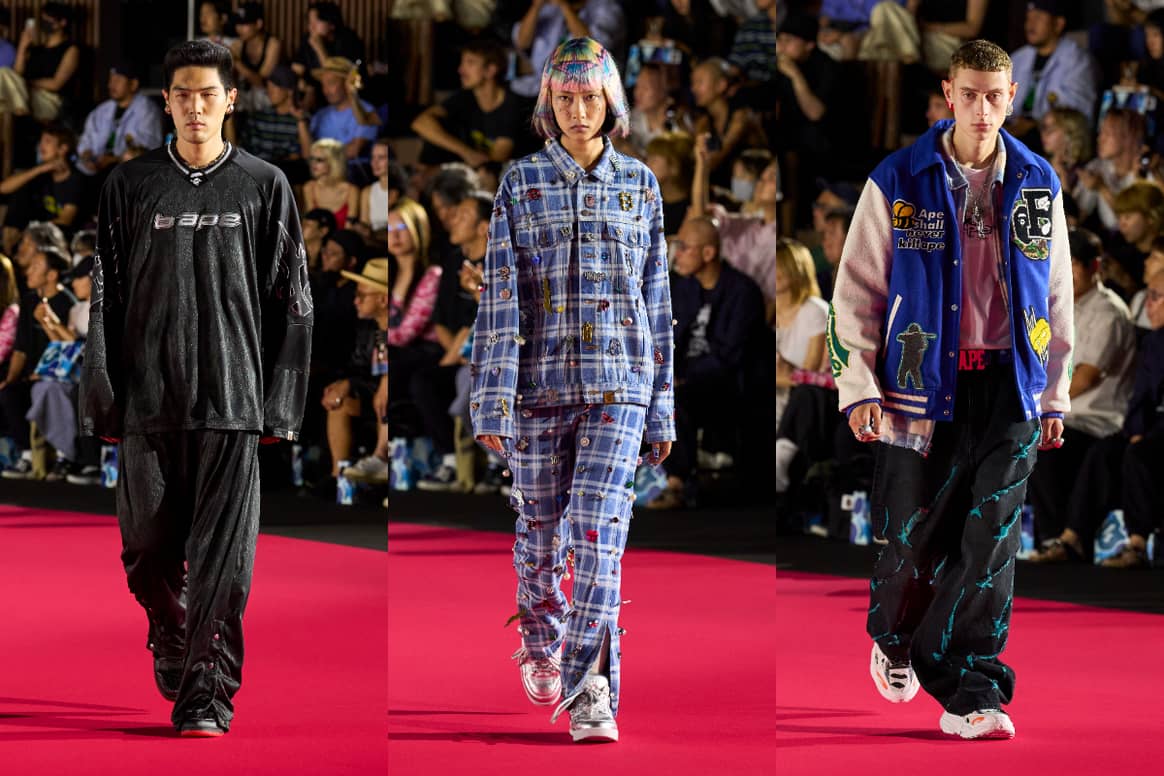
Credits: Launchmetrics Spotlight.
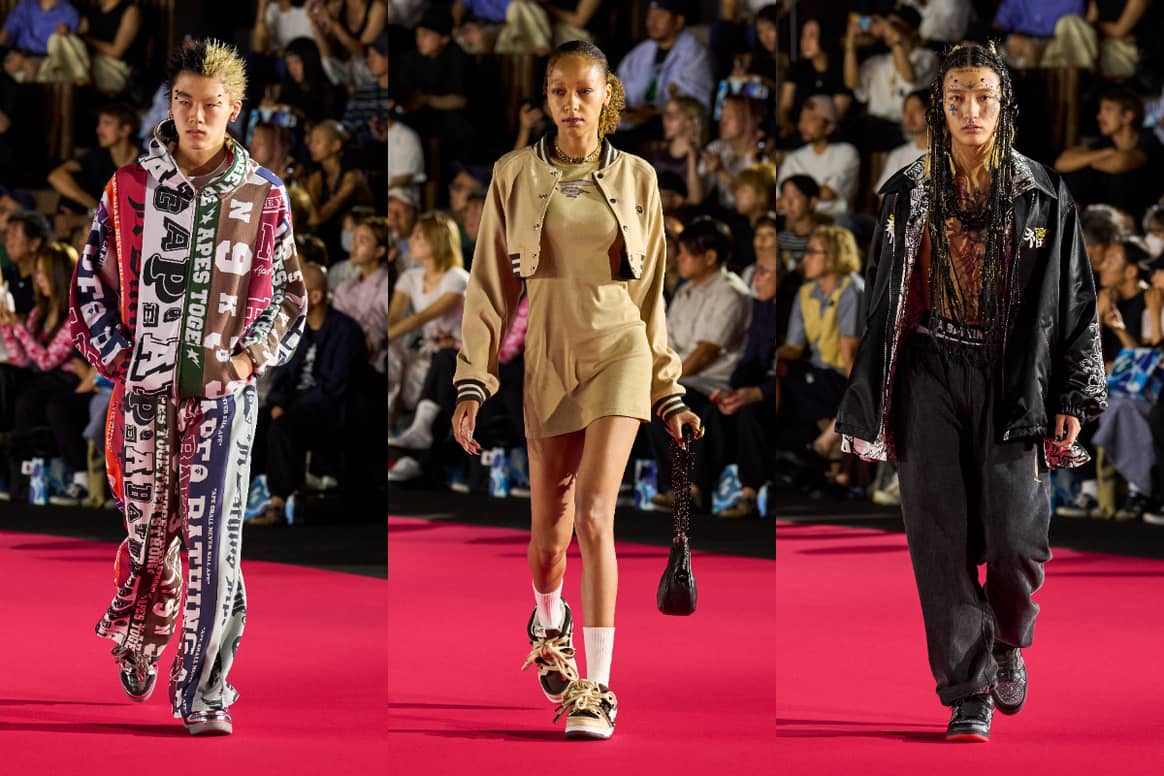
Credits: Launchmetrics Spotlight.
Rakuten’s efforts to bring home locally born brands
In an interview with FashionUnited, the marketing manager of BAPE, said
that following an event in New York in June, holding a show in the
district’s ever-changing setting reflected the shifts the brand has also
seen since its inception. They continued: “We have seen these changes as an
opportunity for growth, which is why BAPE has been able to continue its
brand up until now. We chose to hold a runway to give our fans and
newcomers a deeper understanding of what BAPE is and what it will become.”
The occasion was possible with support from ‘by R’, an initiative by the
headline sponsor of Fashion Week Tokyo (FWT), Rakuten, which launched the
project as a way to encourage the return of Japan-born brands to the
event’s schedule. When announcing BAPE’s participation, Rakuten said that
it was aiming to broaden the appeal of BAPE to more fans, both in and
outside Japan, while also further amplifying the awareness of Rakuten FWT.
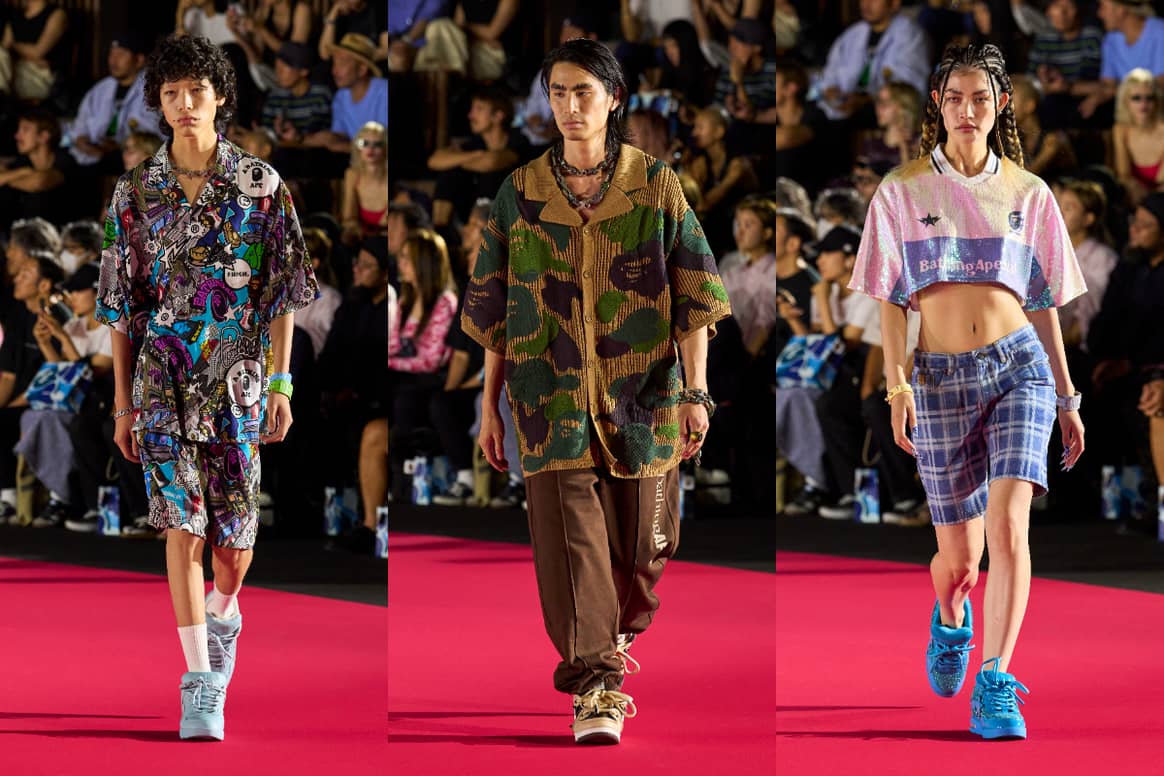
Credits: Launchmetrics Spotlight.
This was further reflected in BAPE’s reasoning for joining the event’s
lineup. When asked what the brand’s motivation was, the marketing
representative said: “The impetus for this project came from our empathy
with the concept of ‘by R’ by Rakuten’s fashion business, “to transmit
fashion from Tokyo to the world”. This is the same concept that BAPE has
been pursuing from Harajuku to the world. Participation in ‘by R’ is a
tribute to BAPE’s roots and celebration of its 30th anniversary, as well as
a way to promote Japanese fashion culture.”
And it appeared from the event that BAPE’s involvement came with much
buzz, from an audience that was both infused with local personalities and
industry insiders. Each sat at the forefront of a circular runway that was
lit up from all angles and accompanied by a backdrop of flutes and Japanese
taiko drums. This rang in the arrival of a stream of models sporting a
total of 82 looks, each of which aimed to portray an “interpretation of
street style’s new frontier”, as stated in the show notes.
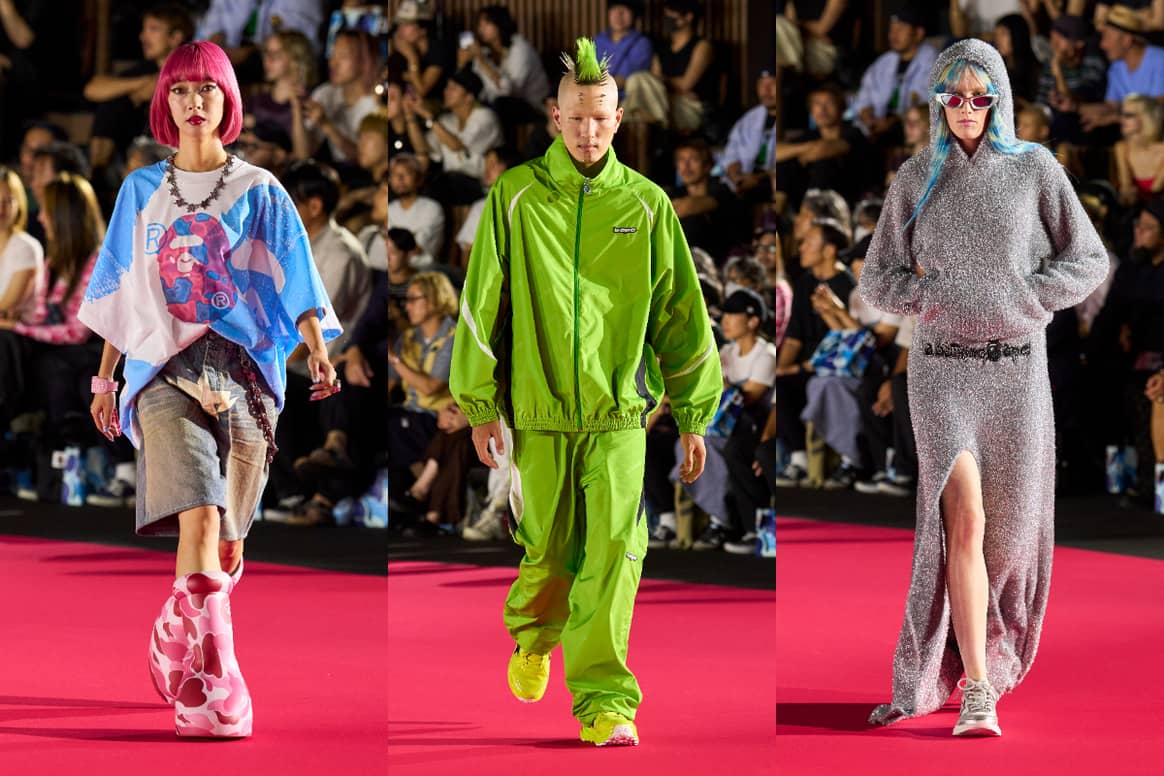
Credits: Launchmetrics Spotlight.
Mainline BAPE, AAPE and APEE get their place in the sun
The first lot to make its way down the runway was BAPE’s mainline, where
the brand’s signature styles took centre stage, albeit in updated forms.
While many of the pieces in the streetwear-centric cascade referenced
classic BAPE tropes, such as eye-catching graphics and sporty monograms,
others took on a more sparkly edge, with garments adorned in shiny material
that decidedly stepped away from the brand’s typically collegiate style.
However, BAPE didn’t stray too far from this aesthetic, as was evidenced in
the second phase of the show in which its youth line AAPE was unveiled.
Here, hip hop, sport and collegiate were distinctly combined in looks
that bore resemblance to American football, baseball and basketball attire.
This was promptly followed by APEE, the brand’s young women’s line, which
once again departed from signature staples towards Y2K femininity, defined
by mini skirts, corsets and crop tops. To round the show out, a parade of
the brand’s trademark shark mascot, ‘Baby Milo’, took a human form. Two
piece suits with the signature shark head hoodie came complete with
oversized hoods and inflated wings, reminding onlookers of BAPE’s roots in
the brand’s quintessential charm.
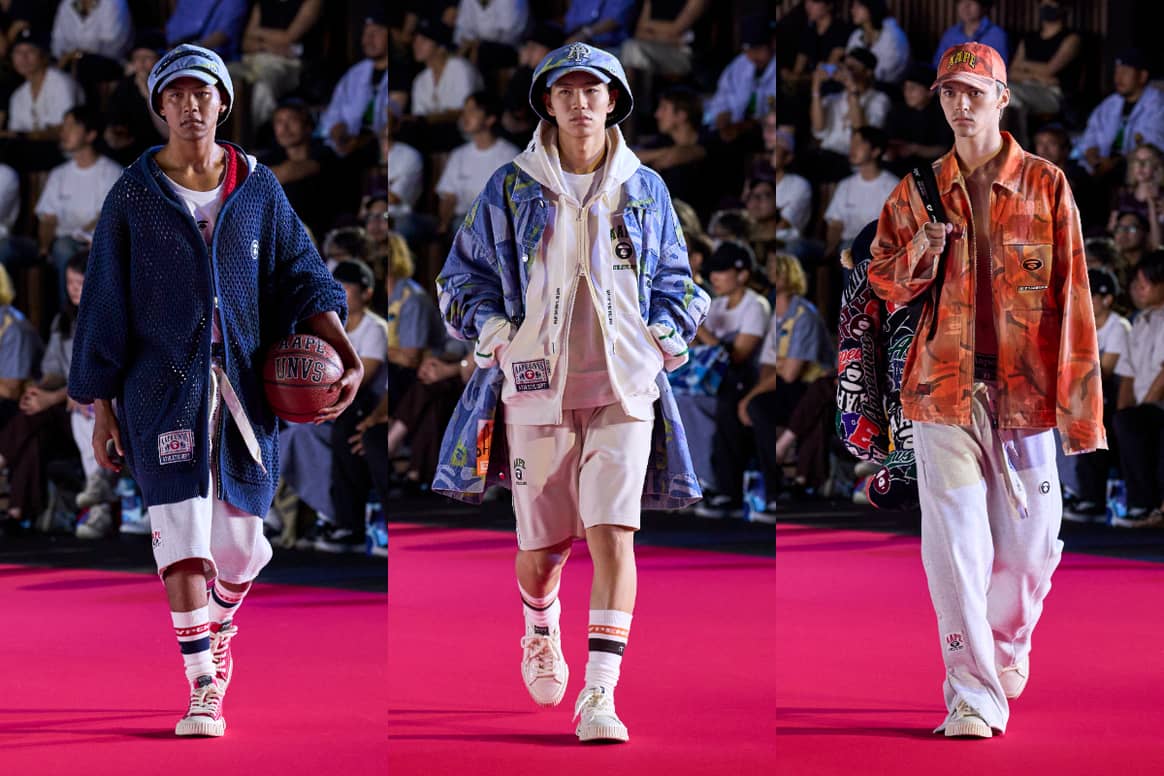
Credits: Launchmetrics Spotlight.
Collaboration, another element integral to BAPE’s identity, was also not
to be missed for this collection. Taking cues from current culture, the
brand looked to MSCHF to supply a handful of its viral ‘Astro Boy Boots’,
footwear that had caused a stir on social media for their comic-like shape,
yet this time appearing in a BAPE camo print. The brand’s marketing manager
reiterated the importance of collaboration to BAPE, noting: “Over the past
30 years, BAPE has become a globally recognised brand for its unique
designs and diverse collaborations with brands and artists. The show also
featured a teaser of boots and other items, and the Japanese-inspired
direction of the music and stage performances could also be considered a
collaboration.”
BAPE sets about connecting with global communities
Now, BAPE is hoping to continue bolstering its presence in both the
Japanese and international markets, riding off the success of the fashion
week in a bid to maintain interest in the eyes of viewers. Such efforts are
helped by the fact that the markets of Japan and the West are becoming less
disparate, as noted by BAPE’s representative, who said the spread of
fashion media and SNS were responsible for these shifts.
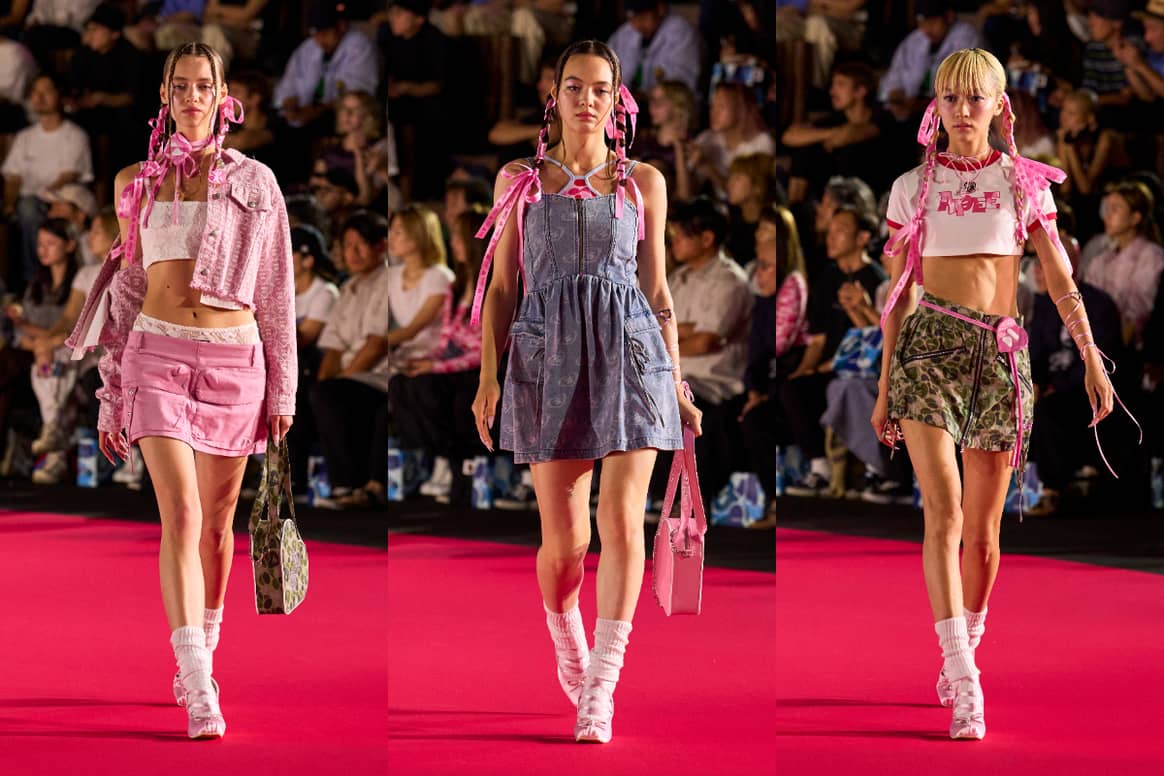
Credits: Launchmetrics Spotlight.
Its inclusion in FWT will also build on the brand’s relationship with
Rakuten, which is to partner with BAPE on a limited-edition merchandise
drop, as well as a joint strategy to leverage their dual strengths. On this
collaboration, BAPE’s representative said: “We believe that BAPE will
expand its reach to consumers through Rakuten’s established e-commerce
platform, while Rakuten’s collaboration with one of the most iconic and
innovative brands in the industry will have a mutually positive impact.”
When asked what we can expect to see from BAPE in the near future, they
concluded: “We will continue to be passionate about pushing the boundaries
of different cultures with endless ideas. As an influential lifestyle
brand, we will continue to expand our channels and reach communities
globally.”
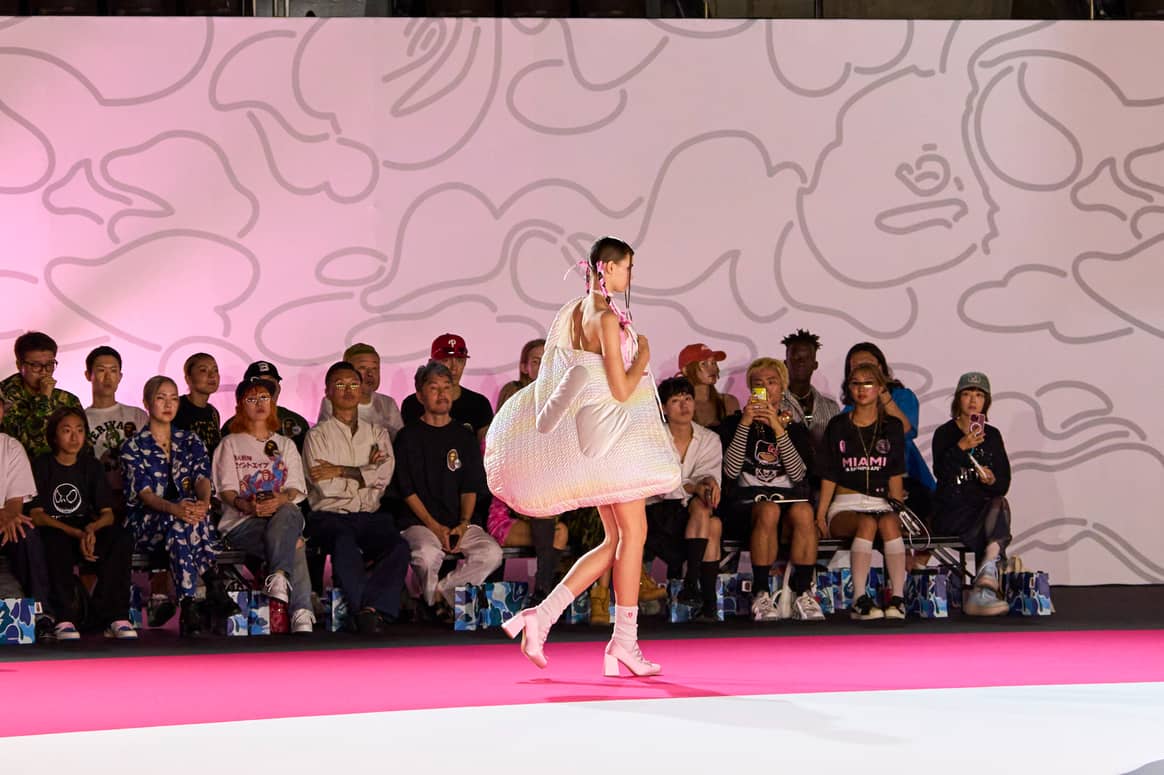
Credits: Launchmetrics Spotlight.